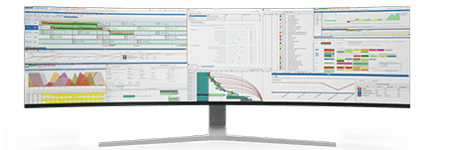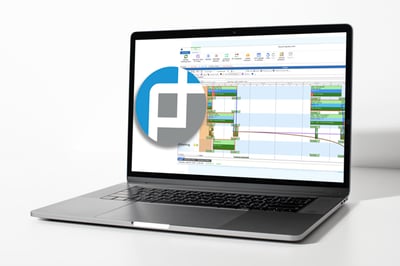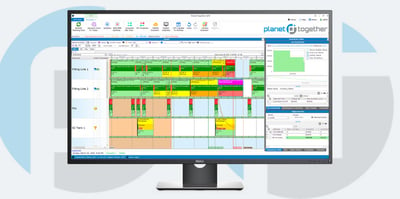Enhancing Supplier Collaboration for Better Schedules in Pharmaceutical Manufacturing
In the pharmaceutical manufacturing sector, the efficiency of production planning hinges on seamless coordination with suppliers. Timely access to raw materials and active pharmaceutical ingredients (APIs) directly impacts a facility's ability to meet production schedules, ensure regulatory compliance, and deliver life-saving medicines to patients. As global supply chains grow increasingly complex, Production Planners are turning to advanced tools and integrated systems to enhance supplier collaboration.
This blog explores how integrating PlanetTogether with leading enterprise resource planning (ERP) systems like SAP, Oracle, Microsoft Dynamics, Kinaxis, or Aveva can revolutionize supplier collaboration and improve production schedules in pharmaceutical manufacturing.

The Challenges of Supplier Collaboration in Pharmaceuticals
Supplier collaboration in pharmaceutical manufacturing is uniquely challenging. High regulatory scrutiny, stringent quality standards, and demand volatility necessitate precision in supply chain operations. Production Planners face common hurdles such as:
Unpredictable Lead Times: Variability in supplier lead times can disrupt production schedules and delay product delivery.
Regulatory Compliance: Ensuring suppliers meet rigorous quality and regulatory requirements adds complexity to supplier management.
Limited Visibility: Lack of real-time data from suppliers often leads to misaligned schedules and inventory shortages.
Demand Fluctuations: Changes in demand forecasts require agility, which is difficult without strong supplier collaboration.
To overcome these challenges, pharmaceutical manufacturers are adopting integrated software solutions that enable real-time communication and collaboration with suppliers.
![]()

The Role of Integration in Supplier Collaboration
Integrated systems bridge the gap between internal operations and external suppliers. When PlanetTogether integrates with ERP systems like SAP, Oracle, Microsoft Dynamics, Kinaxis, or Aveva, it enables a seamless flow of information across the supply chain, offering benefits such as:
Real-Time Data Sharing: Integrated systems provide real-time updates on inventory levels, production schedules, and supplier commitments, reducing the risk of miscommunication.
Advanced Planning and Scheduling (APS): PlanetTogether's APS capabilities optimize production schedules by considering supplier constraints, lead times, and material availability.
Proactive Issue Resolution: Early detection of potential supply chain disruptions allows Production Planners to make informed adjustments to schedules.
Enhanced Forecasting: Integration enhances demand forecasting accuracy, enabling suppliers to align their production with the manufacturer's needs.

Key Features of PlanetTogether for Supplier Collaboration
PlanetTogether’s robust APS system offers several features designed to improve supplier collaboration:
Supplier Constraint Modeling: The system accounts for supplier-specific constraints, such as capacity limits or lead times, when generating production schedules.
Real-Time Alerts: Automatic notifications highlight potential delays or discrepancies in supplier performance, enabling quick action.
What-If Scenarios: Production Planners can simulate different scenarios to assess the impact of supplier delays or material shortages.
Collaboration Portal: A shared platform allows suppliers and manufacturers to exchange data, approve schedules, and manage exceptions collaboratively.

Integrating PlanetTogether with Leading ERP Systems
The true potential of PlanetTogether is unlocked when it integrates with leading ERP systems. Here’s how integration with systems like SAP, Oracle, Microsoft Dynamics, Kinaxis, and Aveva enhances supplier collaboration:
SAP
SAP’s comprehensive supply chain management features complement PlanetTogether’s APS capabilities. Integration allows for:
Synchronizing supplier purchase orders and inventory data with production schedules.
Leveraging SAP’s Supplier Relationship Management (SRM) module for enhanced collaboration.
Real-time visibility into material availability across multiple suppliers.
Oracle
Oracle’s advanced analytics and cloud capabilities enhance decision-making when paired with PlanetTogether. Integration facilitates:
Automated updates to production schedules based on supplier data.
Improved demand planning through Oracle’s AI-driven forecasting tools.
Seamless communication with suppliers using Oracle Cloud’s collaboration features.
Microsoft Dynamics
Microsoft Dynamics offers a flexible platform for mid-sized pharmaceutical manufacturers. Integration with PlanetTogether provides:
Real-time tracking of supplier performance and adherence to delivery schedules.
Integration of production and financial data for cost-effective planning.
Improved transparency with Microsoft Teams for supplier communication.
Kinaxis
Kinaxis’ RapidResponse platform is known for its agility in supply chain planning. Integration with PlanetTogether enables:
End-to-end visibility into the supply chain, including supplier operations.
Rapid scenario planning to adjust schedules based on supply disruptions.
Collaborative planning tools for aligning suppliers with production needs.
Aveva
Aveva’s focus on operational efficiency complements PlanetTogether’s scheduling capabilities. Integration delivers:
Enhanced visibility into supplier constraints through digital twin technology.
Improved coordination between production schedules and supplier deliveries.
Streamlined workflows for managing supplier-related exceptions.
Best Practices for Enhancing Supplier Collaboration
While technology is a key enabler, successful supplier collaboration also depends on adopting the right practices. Here are some actionable steps for Production Planners:
Establish Clear Communication Channels: Use integrated platforms to create transparent and consistent communication with suppliers.
Leverage Collaborative Forecasting: Share accurate demand forecasts with suppliers to align their production schedules with your needs.
Monitor Supplier Performance: Use KPIs like on-time delivery rates and lead time variability to evaluate and improve supplier reliability.
Adopt a Partnership Approach: Foster long-term relationships with suppliers based on mutual trust and shared goals.
Enhancing supplier collaboration is essential for pharmaceutical manufacturers aiming to maintain reliable production schedules in a competitive and highly regulated environment. By integrating PlanetTogether with systems like SAP, Oracle, Microsoft Dynamics, Kinaxis, or Aveva, Production Planners can achieve unprecedented levels of efficiency, transparency, and agility in supplier collaboration.
With the right tools and practices in place, pharmaceutical manufacturers can overcome supply chain challenges, ensure consistent production, and ultimately deliver high-quality medicines to patients on time.
By embracing advanced integrations and fostering strong supplier relationships, Production Planners can not only meet today’s demands but also build a resilient foundation for future growth.
Are you ready to take your manufacturing operations to the next level? Contact us today to learn more about how PlanetTogether can help you achieve your goals and drive success in your industry.
Topics: PlanetTogether Software, Integrating PlanetTogether, Proactive Issue Resolution, Enhanced Forecasting, Real-Time Alerts and Notifications, Pharmaceutical Manufacturing, Improved Supplier Relationships, Increase in Production Efficiency, Reduction in Lead Time Variability, Supplier Constraint Modeling





















LEAVE A COMMENT